tend-, tendo-, ten-, teno-, tenot-, tenonto-, tens-, tent-, -tend, -tension, -tent, -tense, -tensive, -tentious
(Greek > Latin: to move in a certain direction; to stretch, to hold out; tension; as well as tendon, sinew)
portend (verb), portends; portended; portending
1. To foreshadow or to warn people that something is going to happen: The thunder and lightening portended that a storm was about to take place.
2. To indicate or to signify in advance: The icy roads and winter snow storm were portending several auto accidents.
3. To predict or to forecast: The economist on TV was saying that leading economic indicators were portending a recession.
4. Etymology: from early 15th century, from Latin portendere, "to foretell"; originally, "to stretch forward"; from por-, a variant of pro-, "forth, forward" + tendere "to stretch, to extend."

© ALL rights are reserved.

© ALL rights are reserved.
Go to this Word A Day Revisited Index
2. To indicate or to signify in advance: The icy roads and winter snow storm were portending several auto accidents.
3. To predict or to forecast: The economist on TV was saying that leading economic indicators were portending a recession.
4. Etymology: from early 15th century, from Latin portendere, "to foretell"; originally, "to stretch forward"; from por-, a variant of pro-, "forth, forward" + tendere "to stretch, to extend."


Go to this Word A Day Revisited Index
so you can see more of Mickey Bach's cartoons.
1. An omen that indicates that an event is about to occur; especially, an unfortunate one: When Kate slipped on the floor of the store, after coming in from the rain, she had the portent of severe injury to her right wrist that would result in pain for a long time while it was healing.
2. A sign or a warning that something which is usually bad or unpleasant is going to take place: The dark clouds and thunder and lightning were portents that it would soon be raining very hard.
3. Etymology: from Latin portentum, "a sign or an omen" from portemdere, "to foretell or to predict."

© ALL rights are reserved.
Go to this Word A Day Revisited Index
2. A sign or a warning that something which is usually bad or unpleasant is going to take place: The dark clouds and thunder and lightning were portents that it would soon be raining very hard.
3. Etymology: from Latin portentum, "a sign or an omen" from portemdere, "to foretell or to predict."

Go to this Word A Day Revisited Index
so you can see more of Mickey Bach's cartoons.
portentous (adjectives), more portentous, most portentous
1. That which gives a sign or a warning that something which is usually undesirable or bad is going to happen rather soon: "She had a portentous dream that she was going to slip and fall down on an icy sidewalk and break her arm."
2. Arousing awe or amazement or trying to seem important, serious, or impressive: "The politician spoke in a portentous tone about the future of his country."
2. Arousing awe or amazement or trying to seem important, serious, or impressive: "The politician spoke in a portentous tone about the future of his country."
portentously (adverb), more portentously, most portentously
A reference to statements or signs which are important because they show that something unpleasant is very likely to happen: "The economics minister talked portentously about the economic situation."
That which is ominously significant or indicative of something that is about to happen: "The injury to the star football quarterback was a portentousness for defeat."
pretend (verb), pretends; pretended; pretending
1. To claim; profess; allege: Jim pretends to the gourmet restaurant in town, but he doesn't have the money to pay for his dinners there!
2. To claim or profess falsely; feign: Jane pretended an emotion to be cool and unfeeling, but actually she could cry her heart out!
3. To make believe, as in play or in an attempt to deceive; feign: In the stage play, Tim had to pretend blindness in the role he had.
2. To claim or profess falsely; feign: Jane pretended an emotion to be cool and unfeeling, but actually she could cry her heart out!
3. To make believe, as in play or in an attempt to deceive; feign: In the stage play, Tim had to pretend blindness in the role he had.
1. A false appearance or action that is designed to deceive another person or people: The killing in the drama looked real; however, it was obviously only a pretense.
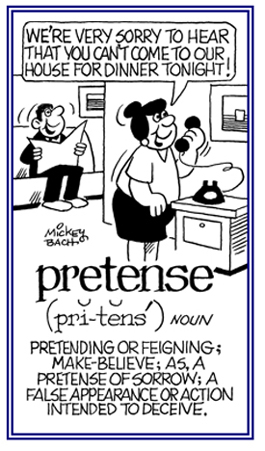
© ALL rights are reserved.
Go to this Word A Day Revisited Index
Jacob called Sally under the pretense of asking her about the homework assignment in the biology class, but it was not the real reason he called her because he just wanted to have a conversation with her.
2. Etymology: from Latin praetensus, "false claim" from prae- "before" + tendere, "to stretch".

Go to this Word A Day Revisited Index
so you can see more of Mickey Bach's cartoons.
1. A claim, especially an unsupported one, as to some distinction or accomplishment: Greg said he came from a wealthy family, but this pretension turned out not to be true because his family was actually poor and he was deep in debt.
2. A pseudo claim or profession: Sally’s pretension about being the most famous pianist in the whole world was just one of the dreams she had.
2. A pseudo claim or profession: Sally’s pretension about being the most famous pianist in the whole world was just one of the dreams she had.
pretentious (adjective); more pretentious, most pretentious
1. Descriptive of a person who claims a position of distinction or merit, even when it is not justified: Don is a pretentious salesman who claims to be the greatest contributor to his company's profitable existence.
2. Relating to the unpleasant quality of a person who wants to be regarded as more impressive, successful, or more important than he or she really is: By using pretentious language, Jack expressed how easy the chemistry test was even though he did not have the highest grade after it was corrected by his teacher.
3. Etymology: from Latin pretentionem, "pretension"; from praetendere, "to pretend" from French prétentieux, "pretension."
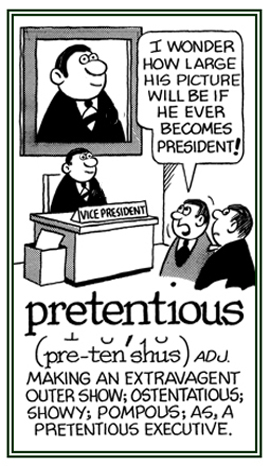
© ALL rights are reserved.
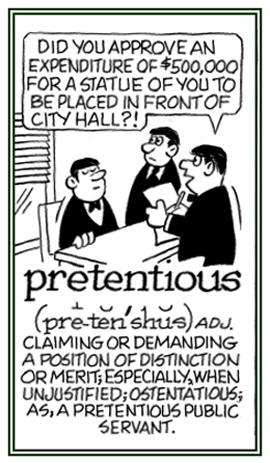
© ALL rights are reserved.
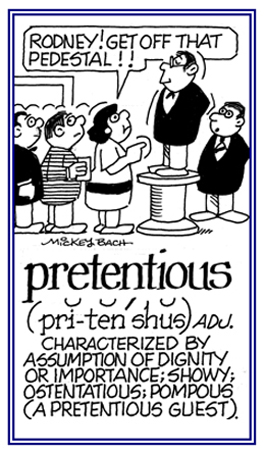
© ALL rights are reserved.
Go to this Word A Day Revisited Index
2. Relating to the unpleasant quality of a person who wants to be regarded as more impressive, successful, or more important than he or she really is: By using pretentious language, Jack expressed how easy the chemistry test was even though he did not have the highest grade after it was corrected by his teacher.
3. Etymology: from Latin pretentionem, "pretension"; from praetendere, "to pretend" from French prétentieux, "pretension."



Go to this Word A Day Revisited Index
so you can see more of Mickey Bach's cartoons.
pretentiously
pretentiousness
sententious (adjective), more sententious, most sententious
1. Referring to a talk, discourse, statement, etc. expressing much in a few words; short and pithy (concise and full of meaning); terse (brief and to the point) and forceful: The Mayor, who was the after dinner speaker, was fond of talking in a sententious manner, which made him popular because people were not interested in long speeches.
2. Concerning the use of maxims, proverbs, etc., especially in a way that is pompous and moralizing; regarding the inclination to moralize more than is merited or appreciated: Joan had a clear speaking style, but when she was writing, she tended to use a more sententious style, filling the pages with moralistic phrases.
3. Etymology: "full of meaning," from Middle French (about 1400-1600) sententieux, from Latin sententiosus, "full of meaning, pithy"; from sententia, "opinion, maxim". The meaning of "addicted to pompous moralizing" was first recorded in 1598.
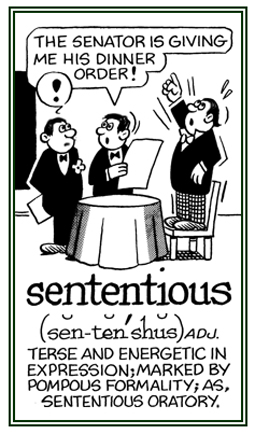
© ALL rights are reserved.
Go to this Word A Day Revisited Index
2. Concerning the use of maxims, proverbs, etc., especially in a way that is pompous and moralizing; regarding the inclination to moralize more than is merited or appreciated: Joan had a clear speaking style, but when she was writing, she tended to use a more sententious style, filling the pages with moralistic phrases.
3. Etymology: "full of meaning," from Middle French (about 1400-1600) sententieux, from Latin sententiosus, "full of meaning, pithy"; from sententia, "opinion, maxim". The meaning of "addicted to pompous moralizing" was first recorded in 1598.

Go to this Word A Day Revisited Index
so you can see more of Mickey Bach's cartoons.
sententiously (adverb), more sententiously, most sententiously
Retarding how a person writes in a manner that is pithy, concise, and expresses much in a few words: The professor of literature emphasized that some authors have been sententiously committing to paper what people should and should not do.
subtend
To extend under or be opposite to in position [to stretch underneath].
subtense
Some related "tension" words are available at this tono- unit.


